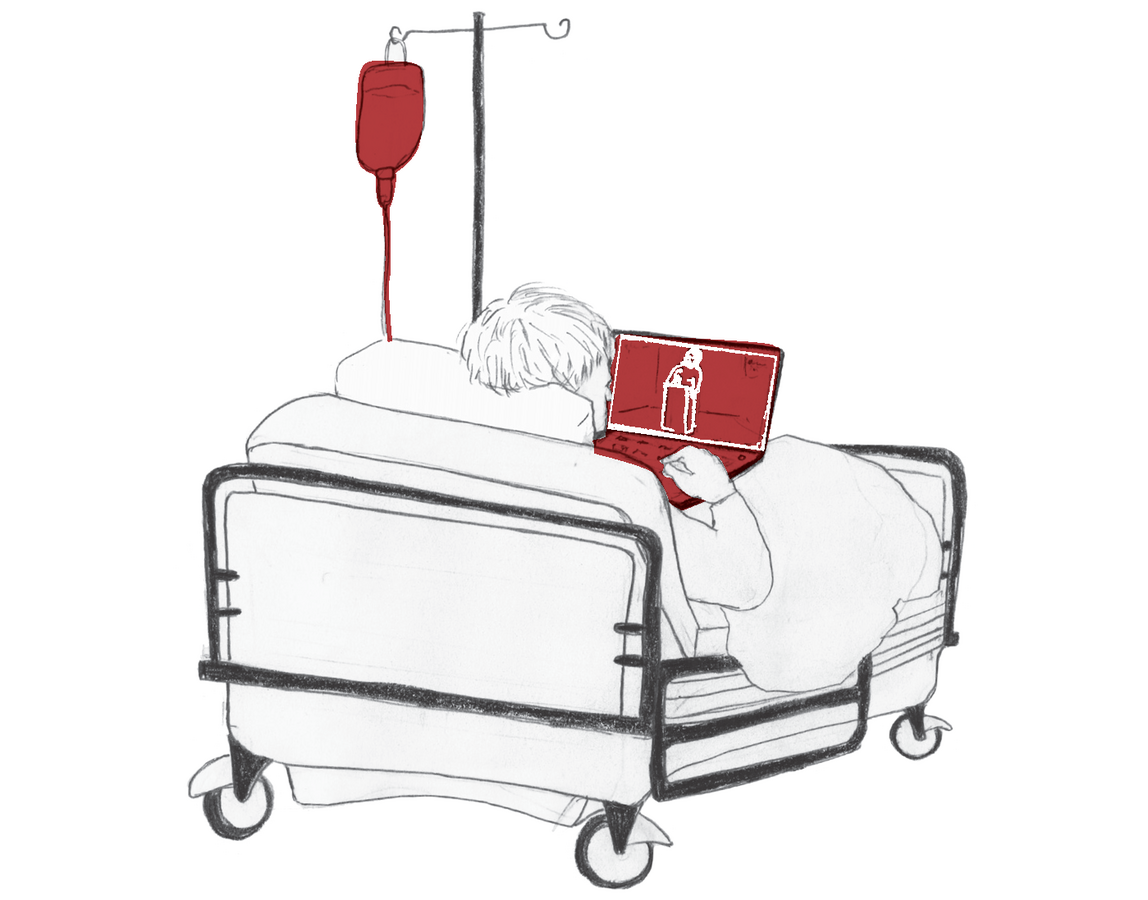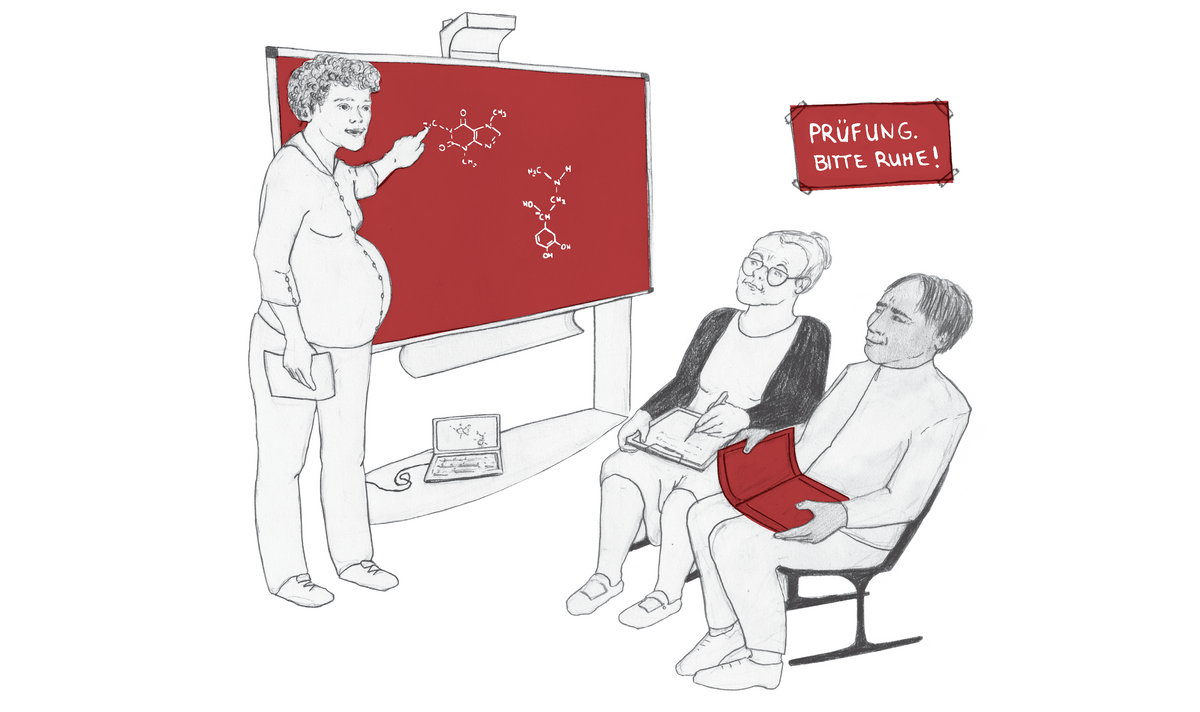The compensation of disadvantages during pregnancy, after childbirth and when breastfeeding is central to a study program based on equal opportunities. In individual cases, the study or examination conditions are modified. However, only the framework conditions are changed and not the content of the examination or the course of study. The required performance always remains the same for all students!
Individual consultation
Here you will find an overview of contact points that offer individual consultation.
Access and admission to studies
The Student Advisory Service offers information on general questions regarding application, admission requirements, aptitude tests and admission procedures, among other things. The Student Office advises on all administrative matters for admission to studies, including applying for hardship or disadvantage compensation and the required evidence.
Studying with child(ren) and family affairs
Mothers-to-be and parents-to-be have a multitude of questions – from organizing to financing their studies when they have a baby. The social counselling service of the Studentenwerk Leipzig provides solutions and family-friendly service through various offers.
Requirements for the compensation for disadvantages
Maternity leave is designed to make it easier for students to balance their education with the specific demands and special situation experienced during pregnancy, after childbirth and when breastfeeding. Compensation for disadvantages ensures that students have an opportunity to study without significant delays.
- Basis of entitlement
Disadvantages due to pregnancy, childbirth or breastfeeding are to be avoided or compensated for in accordance with Section 9 (1) Sentence 4 of the German Act on Maternity Leave (Mutterschutzgesetz – MuSchG)
First of all, there must be a restriction of the study program, for example, quality losses in the study performance or the lack of participation in training events, examinations, internships or stays abroad due to pregnancy, childbirth or breastfeeding. The following table provides an orientation to the possible reasons:
| restriction | description |
|---|---|
| maternity leave | The student takes maternity leave before and after childbirth (in whole or in part). |
| medical education prohibition | The student presents a medical (full or partial) education prohibition. |
| University prohibition due to hazards (Sections 9-14 MuSchG) | During their university studies, pregnant or breastfeeding students may be exposed to risks in some study programmes or modules, for example:
These risks must be assessed and, where applicable, eliminated for all course components or examinations that must be attended or completed in the semesters concerned within the scope of risk assessments. The person responsible for the module concerned is responsible for the risk assessment and must, with the assistance of the Office for Environmental Protection and Occupational Safety, decide whether risks are present. |
| Selective exemptions | The University is generally not permitted to allow a pregnant or breastfeeding student:
|
| Other absences | Increased absences within the meaning of the Maternity Protection Act that must be taken into account may arise:
|
In the second step, it must be examined whether compensation is possible by means of the legally prescribed precautionary measures in accordance with the German Act on Maternity Leave (Mutterschutzgesetz). Precautionary measures include, for example, the reorganization of training activities, time reorganization with the help of substitute or follow-up appointments, or a spatial or material reorganization. However, only the framework conditions are changed and not the content of the examination or the course of study. The required performance always remains the same for all students!
Sometimes the precautionary measure chosen is insufficient (another chair or the possibility of putting one's feet up while writing an exam). In this case, alternative precautionary measures should be sought first, instead of immediately exempting the student from the examination and thus prolonging her studies if necessary.
The submission of an alternative training offer (parallel to an employee's entitlement to another suitable workplace) may also be considered in order to avoid an irresponsible risk. An alternative training offer is thus part of the protective measures according to Section 13 Paragraph 2 Sentence 1 MuSchG. If it is not possible for the university to make such an alternative offer, there is a - possibly partial - prohibition on training, so that the university may not allow the student to take part in the relevant training events (sections 9, 11 and 12 MuSchG). The prohibition on participation may apply to both courses and examinations.
- Example
A student is unable to complete a written exam as scheduled due to pregnancy. According to the risk assessment or on the basis of a medical certificate, she cannot sit for four hours without interruption. In this case, for example, it is a good idea to give the student a 30-minute supervised lie-down break in another room or an accompanied walk after about half of the processing time. This varied exam schedule will allow her to study without delay.
A student has a disadvantage that should be avoided or compensated for within the definition of the MuSchG when
- the university studies extend significantly past the extent that can be inferred from the statutory precautionary measures alone (for example if the university studies are extended by 12 months when a student solely takes standard maternity leave of 3.5 months because an examination is only held once a year)
- (partial) study components that have already been completed must be repeated in full because the academic performance was interrupted due to pregnancy (for example an internship)
- the student is unable to select choose the study opportunities that correspond to their individual content-based focus or preference to a significant extent
Within the scope of the self-determination of pregnant or breastfeeding students, the University is generally required to use a participative approach to find the best compensation for the individual case concerned. Given that the needs of these students can vary, across-theboard compensation for disadvantages is not appropriate for individual cases.
- Please note
The across-the-board recommendation that pregnant students take semesters of leave of absence does not represent sufficient compensation for disadvantages. If the option of providing a remedy, for example by postponing deadlines or easing the stipulated orders, is available in a concrete case, this should be the preferred option.
Important
However, only the framework conditions are changed and not the content of the examination or the course of study. The required performance always remains the same for all students!
Procedure
Students with impairments who require compensation for disadvantages in examinations (including final theses) must submit an application for compensation for disadvantages to the responsible Examination Committee. Also for special forms of courses or performances (for instance laboratory work, internships, excursions). As well as for the organisation and execution of studies (for example, attendance requirements, sequence of courses or modules).
- Important
The following diagram depicts a highly simplified and standardised procedure. In concrete individual cases, the regulations of the faculty concerned always apply (especially with regard to deadlines and evidence)! If examinations are taken in more than one subject at different faculties, more than one application must be submitted to the respective Examination Committee of the relevant faculty.
- Information
The student contacts the responsible study office to find out about the application process, and the eligibility requirements in particular, as early as possible. - Evidence
Evidence of pregnancy or breastfeeding is not required if the student has already reported their status and presented corresponding evidence to the study office Appendix 1: Form for reporting pregnancy or breastfeeding and declaration of consent to participation in educational components ENG / DEU. This also applies if the impairment and the further requirements of compensation for disadvantages have clearly been met. - Submitting an application
The student submits a written application for compensation for disadvantages to the responsible Examination Committee as early as possible and four weeks before the examination or start of the assessment period at the latest. Recommended is the use of Appendix 1: Application form for compensation for disadvantages ENG / DEU. - Decision
The responsible Examination Committee decides on the application and informs the student of its decision in writing one week before the examination or start of the assessment period at the latest.- Approval
The Examination Committee informs all individuals and bodies relevant to or responsible for the implementation of compensation for disadvantages. The compensation for disadvantages is implemented. - Rejection
The applicant can accept the (partial) rejection or file an objection with the Examination Committee within four weeks.
- Approval
Form
The application must be submitted to the responsible Examination Committee in writing. If the application is submitted via e-mail, the student e-mail address should be used. Students are recommended to use the corresponding application form provided by the University (Appendix 1: Application form for compensation for disadvantages ENG / DEU). Applications can, however, also be submitted in writing without a form.
Deadline
The application must be submitted before the examination. Applications will not be accepted after an examination.
In concrete individual cases, the regulations of the faculty concerned always apply (especially with regard to deadlines and evidence)! If there are no regulations, the application should be submitted to the responsible Examination Committee at least four weeks before the examination or start of the assessment period. If the reasons for compensation for disadvantages only arise after this deadline or the examination candidate only becomes aware of them after the deadline, the application must be submitted immediately.
Submitting applications at an early stage is important in order to guarantee that the Examination Committee has a sufficient amount of time to assess the case and make a decision (and clarify any questions that arise during this process with the student, for example). Furthermore, the implementation of compensation for disadvantages in terms of the organisation of examinations also requires time, for example in the case that a separate room needs to be organised.
Applications submitted at short notice may be necessary if the impairment is only diagnosed at short notice. The reason for such an application at short notice should also be specified in the application or the evidence submitted (cf. content and evidence). The Examination Committee should provide the applicant with written confirmation that the application has been received.
The application should contain the applicant’s enrolment number, study programme, surname and first name, address and, where necessary, student e-mail address. Furthermore, the desired examination modifications should be specified as concretely as possible, and reasons should be given as to why they are necessary. Evidence of pregnancy/breastfeeding is not required if the student has already reported their status and presented corresponding evidence to the study office (Appendix 1: Form for reporting pregnancy or breastfeeding and declaration of consent to participation in educational components ENG / DEU.). This also applies if the impairment and the further requirements of compensation for disadvantages have clearly been met.
Objection
The decision on compensation for disadvantages is an administrative act, the implementation of which can be reviewed with recourse to the administrative court. The respective examination regulations contain information on the requirements for possible opposition proceedings. If compensation for disadvantages has already
Obligation to report problems immediately
If compensation for disadvantages has already been granted and is not correctly implemented during the examination, the examination candidate has an obligation to report problems immediately. If, for example, a time extension or granted pauses are not provided in accordance with the application during the examination, this must be reported to the examination supervisor or examiner immediately. Problems cannot be reported after the examination.
- Please note
The applicant is generally responsible for procuring any aids or resources. A pool for hiring aids and resources for the implementation of compensation for disadvantages (for example laptops with speech output) has also been established at the University and an accessible workstation for examinations has been created (cf. Appendix 3).
Important
Only the framework conditions are changed and not the content of the examination or the course of study. The required performance always remains the same for all students!
Possible measures
Possible approaches and examples of compensation for disadvantages.
The decision on the form of compensation for disadvantages is at the discretion of the Examination Committee as the responsible examination authority. When making this decision, the Examination Committee is not bound to medical recommendations or the proposals made by the applicant but should factor these into the decision as important expert assessments. The scope of discretion of the Examination Committee with regard to the arrangement of compensation for disadvantages is limited by the principle of “full compensation for disadvantages: yes; privilege: no”.
- no under-compensation
This means that the type and scope of compensation for disadvantages must be determined in a way that ensures that the limitation when providing evidence of academic performance is fully compensated for (no under-compensation). This means that the compensation for disadvantages not only enables the applicant to ‘somehow pass’ the examination but also gives them the opportunity to provide evidence of all of their skills and knowledge to the full extent. - no privileged overcompensation
The type and scope of compensation for disadvantages must be determined in a way that ensures that the disadvantage is not ‘overcompensated for’. The applicant must not receive privileges over fellow students.
- Example
The applicant requires several short breaks due to breastfeeding. They therefore submit an application to extend their written examination duration by 60 minutes to the Examination Committee. In contrast, the Examination Committee grants them an extension for the time actually taken for breaks.
Only modifications concerning conditions and forms of evidence of academic performance are generally possible. The qualification objectives specified in the Study Regulations are unaffected by compensation for disadvantages; the content-related requirements must remain in place. The replacement of one examination format with another must be checked particularly carefully and is only permitted when there are no other possible measures for compensating for the disadvantages. The use of a different assessment standard or not assessing a (partial) component are not possible.
In all cases, information that is as precise as possible with regard to the impacts of the individual impairment on the examination performance required and on the conditions of the examination concerned is required for a qualified decision on the selection of measures of compensation for disadvantages. A separate decision based on the individual case in question must therefore always be made with regard to the type and form of compensation for disadvantages.
The student with a disadvantage is the expert when it comes to their own disadvantage, its impacts and potential compensation measures. The Examination Committee should therefore involve students in the decision-making process, or the decision on the concrete compensation measure should be made ‘in consultation’ with the examination candidate concerned. Universally valid recommendations in the form of a fixed ‘catalogue’ cannot, be formulated. The following table can therefore be used as an orientation tool.
- Important
The choice of measures must be oriented towards the principle of equal opportunities and not based on the resources available. Rejecting an extension of the examination duration or assessment period due to a lack of supervisors is therefore, for example, not permitted. A so-called ‘resource-based reservation’ can only be expressed within stringent limits.
| Basic approaches | Example |
|---|---|
| Alternative examination date | If there is already an examination date for several students, this date can be moved forward or backward. For example, the appointment could take place following the maternity leave period. An extra date only for the student concerned can also be considered. Relevant reasons may be that:
|
| Substitution for examination performances | Sometimes the student is unable to perform a particular examination performance or the examination has hazards. Substitute performance may include attendance or participation, a lecture, a short or accompanying practical, a written exam, or a term paper. |
| Additional rest breaks (not writing time extension!) | Sometimes the student needs breaks for breastfeeding, expressing milk, or a lie-down break. Then an extension by the actual breaks up to a fixed total time can be considered. |
| Splitting of examination performances | The mental or physical stresses may be too high throughout the duration of the test. The risk assessment can provide some indications. In this case, it may be advisable to split the examination into parts. |
| Change of the place of examination | A change of examination location may be necessary, if for example:
|
| Use of aids during the examination | The use of assistive devices may enable participation in the examination. |
| Extension of a deadline | The extension of a deadline may be considered for a seminar paper, term paper, bachelor's thesis, master's thesis, scientific term paper or admission thesis, (doctoral thesis), for example if
|
| Moving the time period for editing |
|
| Framework of an internship | The internship could take place earlier or later, be completed part-time instead of full-time, or with an interruption (relevant especially in medicine, teaching, childhood pedagogy, health, nurse), e.g.
|
Source: Deutsches Studentenwerk (2019): Leitfaden für Hochschulen zum Mutterschutz im Studium, p. 56 f.
Compensation for disadvantages for the organisation and completion of university studies may be necessary if study and examination regulations do not provide much scope for the individual arrangement of university studies. Students with impairments actually often depend on such scope. Given that the same impairments can have extremely different impacts and the requirements of each subject are always individual, general guidelines for compensation for disadvantages for the organisation and completion of university studies are not possible. The individual case plays the deciding role, and individual solutions must be found.
- Example
The registration period for a course with restricted participation starts during the maternity leave period. Re-registration for the course would not be possible until the following semester. This would mean that the student would exceed the standard period of study. Therefore, the student is exceptionally given the opportunity to register before the regular registration period.
Given this wide range of fields of activity and possible measures, responsibilities and contacts, there is no formal (application) procedure for compensation for disadvantages for the organisation and completion of university studies. The general rule is that the bodies that are usually responsible for the field of action concerned are also responsible for compensation for disadvantages. Guidance on special study schedules, for example, is provided by the responsible study office, and the schedules are subsequently agreed in writing with the Examination Office. Given that there are no deadlines for such measures of compensation for disadvantages, but the implementation can be complex, students should be sure to obtain information and make arrangements in good time.
- Important
The entitlement to compensation for disadvantages also applies to the organisation and completion of university studies. In case of doubt, these students can therefore also submit a written application for compensation for disadvantages to the Examination Committee and additionally have the option of filing an objection in the case of (partial) rejection of the application. The rule that the implementation or organisation of compensation for disadvantages cannot simply be passed on to the student also applies in such cases!
| Possible approaches | Example |
|---|---|
| Approval of additional excused absences for courses | In the case of (practical) exercises or seminars, for example, if
|
| Moving up the registration deadline | Bringing forward the registration deadline for courses with limited attendance, for example, if
|
| Contingent reservation | Reservation of contingents for students with children for educational courses with attendance limitations, for example, if
|
Source: Deutsches Studentenwerk (2019): Leitfaden für Hochschulen zum Mutterschutz im Studium, p. 56 f.
Q&A
Here you will find answers to frequently asked questions.
Where do I have to submit the application for disadvantage compensation?
You must submit your application for disadvantage compensation to the relevant Examination Committee or Examination Office in good time. In some courses of study, however, the examination is not conducted by the Leipzig University. These include examinations at the state level of the courses of study in teaching, law, medicine, dentistry, veterinary medicine or pharmacy. In this case, you must submit the application to the corresponding Examination Office. Processing then usually takes longer. You may also need time to file an appeal.
Where do I have to submit the application for disadvantage for compensation for a compulsory internship or an obligatory semester abroad or internship abroad or offer a dual degree with another (foreign) university?
The general rule is that the university or internship host at which the student is enrolled or with which the student has an internship contract during their time abroad is responsible for compensating for the disadvantage that arises during this period. As the university sending the student abroad, Leipzig University can, however, be deemed to have shared responsibility when the implementation of the compensation for disadvantages within the scope of an internship or semester abroad affects the continuation of their studies at Leipzig University.
What do I have to consider when studying several subjects?
Are you studying several subjects at the same time, for example in your teacher training? Please note that you may have to apply to different Examination Committees for compensation for disadvantages in the individual subjects.
How to distinguish between compensation for disadvantages and cases of inability to take an examination or withdrawal from examinations?
Is the impairment an acute, temporary health impairment (for example a bad case of the flu)? In this case, inability to take an examination may apply and withdrawal from the examination comes into consideration.





